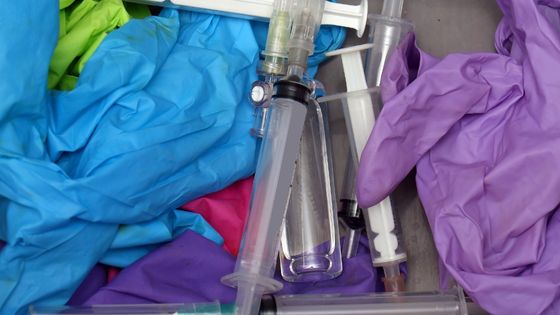The process of setting up an efficient healthcare waste management system isn’t easy and following specific rules that govern the disposal of medical waste requires care in planning. Businesses and homes which produce medical waste need to be in compliance with federal and local regulations.
To make sure you’re effectively taking care of your trash, here are a few ideas to aid you in organising your workplace and keeping your employees, your patients, and your surroundings safe.
Conduct Regular Employee Training
The Occupational Safety and Health Administration (OSHA) requires annual written, documented training in blood-borne pathogens for all employees exposed to germs that can cause infection. A lack of effective training could lead to more workplace injuries and an increased risk of ill-conceived disposal methods.
Don’t Leave Medical Waste Containers Open
Once healthcare waste is disposed of in the container it’s stored in, it must be secured at all times. The openness of a container for collection could lead to contamination, employee or patient exposure, and spills.
Make Sure to Keep Pharmaceutical Waste Separate From Other Medical Waste Types
There are many different kinds of medical waste, all having specific disposal needs. Make sure that all types of waste are separated in containers specifically designed to make it easy and efficient disposal.
Do Not Transport Your Medical Waste
If your business is moving anywhere in Texas or next door, don’t bring your trash with you. It is important to note that the Department of Transportation and the United States Postal Service both have regulations on who can and cannot transport hazardous or hazardous substances.
Be Sure to Keep Alcohol, Aerosols, And Any Other Chemicals Out Of Your Medical Waste
Certain types of waste must be separated and some substances are classified as dangerous and require to be kept distinct from normal medical waste.
The safety of your community is the most important thing to think about when planning the workplace and safe management of healthcare waste plans.
Planning and developing disposal guidelines and steps will ensure a seamless waste disposal process. Professionals can help you locate the right disposal company in your local area to complete the task.
How Do I Dispose of Medical Waste?
Proper disposal of medical waste is essential to ensure that the public is protected. Do not flush any pills as well as other medical waste into the sewer. This can infect the water system and put people working in sanitation, the janitors and the rest of your community at risk.
To ensure that everyone, and even the environment, is safe, you can use an organisation for medical waste disposal to eliminate your waste. There are a variety of options that you can select from:
Call-In Medical Waste Management Services
If you produce medical waste in a variety of ways or simply want to make sure your bins are full prior to collecting your waste, On-call services are perfect for you.
In this case, the service provider will provide the proper containers to dispose of your waste. You can fill them up as you go and when they’re full, you give them a phone call to collect your garbage. The service is offered on a per-demand basis.
Kits For Returns, Mailbacks And Shipping
Sending back medical waste can be an affordable and convenient option if you produce only a little amount of waste or you don’t want to spend for pick-up fees a mail-back service could meet your requirements.
Your service will provide you with an electronic mail back kit that includes everything you need: the clinical waste bag container, the packaging container for shipping, prepay shipping label, directions and more.
Every kind of trash can be send in the mail, including mercury, amalgam sharps, soft waste and even liquids, provide they are keep in a safe container.
Regularly Scheduled Medical Waste Disposal
If your company is continuously producing huge amounts of waste, then regularly schedule (or continuous services) can be a good option. Through this type of service, you’ll be provided with large bins to be distributed throughout your area.
This system ensures that you don’t need to be concerned about waste disposal getting out of control. Drivers are dispatched to collect your garbage and do the dirty job of disposing of it.
With the many options available from medical waste disposal service providers, you’re sure you’ll find one that will meet your requirements.
Some Tips on Medical Waste Safety Compliance
The day-to-day tasks of doctors are demanding and difficult. They not only have to solve unsolved complex issues every day and they have to be aware of the latest and most current medical procedures, practices and laws.
Conformity to HIPAA (Health Insurance and Porability and Accountability Act), OSHA (Occupational Safety and Health Administration) The Bloodborne Pathogens Standard, and other regulations in the industry takes some time and effort.
Safety regulations and rules change constantly, which means professionals (and all office personnel) are constantly learning, and improving their skills, knowledge and office technology.
This article will assist you to ensure that your medical practice is following the security procedures for clinical waste bin collection.
Failure to properly dispose of medical waste that has been contaminate could result in significant penalties and even the denial of your license or practice. Instead, we’ll help you ensure that you’re protect.
Keep Up-To-Date On Training
A safe medical waste disposal course is require under each of OSHA as well as HIPAA to all workers; however, specifics about what and how to train aren’t specifying. There’s a lot that you can learn but here are a few fundamental concepts you should be sure to cover:
Design procedures
Outline how to distribute and follow the specific steps for the disposal of waste. Safety Compliance Training
Labels
Clearly and easily label all chemical and waste containers.
Sort Waste into Categories
Waste that is stored is required to be classified and classified as hazardous or non-hazardous.
Diagram Waste Procedures/Bins
If you are storing medical waste, you need diagrams that show where and how to store hazardous chemicals and substances.
Examine hazardous waste containers
Every week, inspections for hazardous waste bins need to be recorded and carried out to ensure their safety.
Use the right packaging
The medical waste material needs to be appropriately kept in a sealed container during transport, storage and finally disposal. There are various types of packaging that are suitable for everyday clinical waste bins, medical waste, as well as sharps.
Maintain Your Records With Care
Both OSHA, as well as HIPAA, requires that training methods and sessions be record. It is important to record the dates of training sessions, the instructor’s name and credentials as well as the contents of the training as well as the names of the participants who attend the course.
If you are handling dangerous chemicals, standardise safety sheets (also call material safety sheets) are require to be available to all employees, and be locate close to chemical storage or use areas.
Develop And Document Safety Policies Plans, Procedures, And Policies
Make safety plans and procedures and give them to employees so that they are aware of the risks and how to act in the event of incidental accidents.
This standard is align to the Globally Harmonise System of Classification and Labelling of Chemicals (GHS) and offers an approach common to categorising the handling, handling, and disposal of chemical information that could be hazardous.
Develop The Exposure Control Plan Create an Exposure Control Plan
Plan ahead in the event that employees are expose to OPIMs or blood. It should be consistent with the requirements of the Bloodborne Pathogens Standard and include a detailed plan on the steps to prevent and manage exposure to infectious substances.
Emergency Preparedness Program
Write down and distribute a set of procedures to follow in the event of an emergency, including the proper way to clean up in the event of a dangerous spill. It is important that everyone knows the procedures from beginning to end.



















